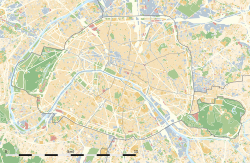University Paris-Sorbonne
| Université Paris-Sorbonne (Paris IV) | |

Logo of Paris-Sorbonne University
|
|
| Type | Public |
|---|---|
| Established | 1970 |
| Budget | €118,800,000 |
| President | Barthélémy Jobert |
|
Academic staff
|
1,300 |
|
Administrative staff
|
774 |
| Students | 23,505 |
| Undergraduates | 13,900 |
| Postgraduates | 6,916 |
| 2,508 | |
| Location |
Paris, France 48°50′55″N 2°20′34″E / 48.84861°N 2.34278°ECoordinates: 48°50′55″N 2°20′34″E / 48.84861°N 2.34278°E |
| Campus | 12 urban campuses |
| Newspaper | Presses de l'Université Paris-Sorbonne |
| Colours | Indigo, Gold |
| Athletics | Association Sportive de Paris IV |
| Nickname | Paris IV |
| Affiliations | Sorbonne University |
| Website | www |
Paris-Sorbonne University (also known as Paris IV; French: Université Paris-Sorbonne, Paris IV), is a public research university in Paris, France. It was established in 1970 as one of the main successor of the University of Paris (the Sorbonne), which ceased to exist following student protest in May 1968. It took over the Humanities and Languages faculties of the University of Paris.
The university enrolls about 24,000 students in 20 departments specializing in arts, humanities and languages, divided in 12 campuses in Paris. Seven of the campuses are situated in the historic Latin Quarter, including the historic Sorbonne university building, and three in Marais, Malesherbes and Clignancourt respectively. Paris-Sorbonne also houses France's prestigious communication and journalism school, CELSA, located in the Parisian suburb of Neuilly-sur-Seine, maintains about 400 international agreements, and is a founding member of the Sorbonne University alliance with Pierre and Marie Curie University.
The universities of Pierre and Marie Curie (Paris 6) and Paris-Sorbonne (Paris 4) have announced a merger with the intention to create a new university including three faculties: Sciences, Medicine (currently belonging Paris 6) and Human Sciences (currently belonging to Paris 4). This new university will start first January 2018.
...
Wikipedia

